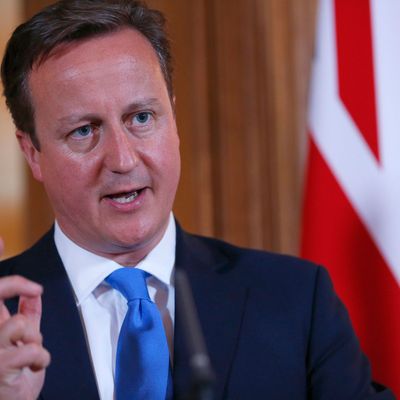
If you haven’t heard already, U.K. Prime Minister David Cameron is not a fan of porn. Cameron has made it harder for horny British teenagers to get access to XXX-rated material online by teaming up with Britain’s leading Internet service providers to implement a rigid filter system. As the BBC details, Cameron’s plan came as the result of a months-long negotiation with ISPs that provoked anger on both sides, before ultimately being worked out.
It’s unclear why porn-prevention is getting such priority at 10 Downing Street. But Cameron’s counter-smut campaign, while politically controversial, is a fascinating study in behavioral economics.
First, it’s worth noting that if he really wanted to curb porn viewing, Cameron could have pushed for a law requiring a blanket porn-ban across all U.K.-based ISPs. Instead, he’s embracing a theory economists call “soft paternalism,” which tries to incentivize certain choices in a market through small policy tweaks without banning their alternatives entirely.
The ur-text of soft paternalism is Richard Thaler and Cass Sunstein’s 2008 book, Nudge. Basically, the authors define soft paternalism as the theory that people are inherently choice-averse, and that by subtly rearranging decisions to take advantage of our laziness and forgetfulness, so-called “choice architects” can help make our lives better. If it wants to encourage children to eat healthfully, a grocery store chain can stock granola at a child’s eye-level and place sugary cereals on the top shelf, or put fruit toward the front of cafeteria lines rather than after the fries. If a government wants to make sure its citizens are saving for retirement, it can make a law that automatically enrolls people in their employers’$2 401(k) plans, instead of making them actively opt in. These examples of soft paternialism have worked wonderfully, and the concept has caught on among government types. (Obamacare, among other Obama administration policies, contains a number of nudge-like provisions.)
Cameron is nudging online porn-viewing habits. He originally pushed for a so-called “default-on” policy at Britain’s top ISPs. Under the default-on plan, your Internet service would come with anti-porn filters as the standard option, and you’d have to call the ISP to have them removed if you wanted to watch porn.
But ISPs hated Cameron’s plan. It’s awkward to require your customers to call you and specifically request access to porn, and it would give a market advantage to ISPs that didn’t have the filter requirement. And so the ISPs negotiated an alternative policy, called “Active Choice +,” that keeps the standard, filter-free Internet access as the default option for existing customers, but lets new customers choose filters when signing up, if they want them. Active Choice + is a much weaker proposal, from a behavioral economics perspective, since keeping filters opt-in for existing customers preserves the existing choice regime for most subscribers. But it was politically palatable, and it’s now the law of the land.
That’s all well and good. What makes no sense at all is that Cameron is now bragging about his new “default-on” rules, even though the plan he and the ISPs agreed to was Active Choice +. In other words, he’s calling a dog a cat. A letter leaked to the BBC from Cameron’s Department of Education presaged this strategy:
The prime minister believes that there is much more that we can all do to improve how we communicate the current position on parental internet controls and that there is a need for a simplified message to reassure parents and the public more generally. Without changing what you will be offering (ie active-choice +), the prime minister would like to be able to refer to your solutions are “default-on”
No matter how you slice it, Cameron’s victory lap is highly misleading. Under Active Choice +, new customers will have filters as the default option, but existing users will still have to opt in. That’s not a soft nudge, not a hard one. And it means that Cameron is either being deliberately deceptive by claiming that the new plan is fully opt out, when it’s really only partially so, or he’s mistaken about what porn-prevention measures he actually agreed to. Either way, the back-and-forth over Cameron’s anti-porn campaign shows just how seriously politicians take behavioral economics, and how important the details of choice architecting are to get right.





























